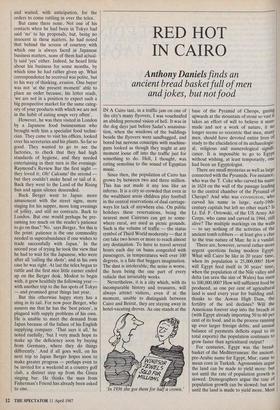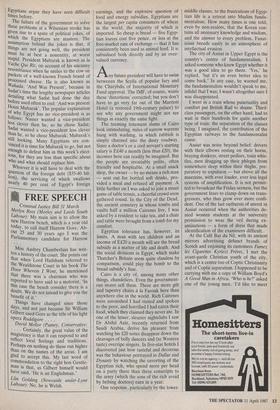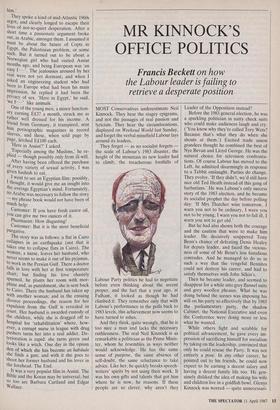RED HOT IN CAIRO
Anthony Daniels finds an
ancient bread basket full of men and jokes, but not food
IN A Cairo taxi, in a traffic jam on one of the city's many flyovers, I was vouchsafed an abiding personal vision of hell. It was in the dog days just before Sadat's assassina- tion, when the windows of the buildings beside the flyovers were sandbagged, and bored but nervous conscripts with machine- guns looked as though they might at any moment loose off into the traffic just for something to do. Hell, I thought, was eating semolina to the sound of Egyptian music.
Since then, the population of Cairo has grown by between two and three million. This has not made it any less like an inferno. It is a city so crowded that even in the wealthiest areas children play football in the central reservations of dual carriage- ways for lack of anywhere else. On public holidays these reservations, being the nearest most Cairenes can get to some- where rural, are used as picnic grounds. Such is the volume of traffic — the status symbol of Third World modernity — that it can take two hours or more to reach almost any destination. To have to travel several hours each day on buses congealed with passengers, in temperatures well over 100 degrees, is a fate that beggars imagination. The dust is intolerable; the noise is worse, the horn being the one part of every vehicle that invariably works.
Nevertheless, it is a city which, with its incomparable history and treasures, will always attract visitors, even if at the moment, unable to distinguish between Cairo and Beirut, they are staying away in hotel-vacating droves. As one stands at the 'In 1936 she got them for half a crown.' base of the Pyramid of Cheops, gazing upwards at the mountain of stone so vast it takes an effort of will to believe it man- made and not a work of nature, it no longer seems so eccentric that men, manY men, should have devoted entire lives of study to the elucidation of its archaeologic- al, religious and numerological signifi- cance. It is impossible to go to Egypt without wishing, at least temporarily, one had been an Egyptologist.
There are small mysteries as well as large connected with the Pyramids. For instance, who was the T. Coke who carved his name in 1624 on the wall of the passage leading to the central chamber of the Pyramid of Cheops? And who was COVINGTON, who carved his name in large, early-19th- century capitals but left no other mark? Is Lt. Ed. F. Ortowski, of the US Army Air Corps, who came and carved in 1944, still alive? The multiple markings on the walls — to say nothing of the activities of the ancient tomb robbers — at least give a clue to the true nature of Man: he is a vandal.
There are, however, several rather more urgent questions facing modern Egypt. What will .Cairo be like in 20 years' time, when its population is 25,000,000? How will Egypt feed itself in 30 years' time, when the population of the Nile valley and delta (an area the size of Wales) has risen to 100,000,000? How will sufficient food be produced, as one per cent of agricultural land is used every year for building and, thanks to the Aswan High •Dam, the fertility of the soil declines? Will the Americans forever step into the breach as (with Egypt already importing 50 to 60 per cent of its food, and in the process running up ever larger foreign debts, and annual balance of payments deficits equal to its total exports) the population continues to grow faster than agricultural output?
For centuries, Egypt was the bread- basket of the Mediterranean: the ancient, pre-Arabic name for Egypt, Misr, came to mean corn in Turkish. Agronomists argue the land can be made to yield more: but not until the rate of population growth is slowed. Demographers argue the rate of population growth can be slowed: but not until the land is made to yield more. Most Egyptians argue they have seen difficult times before.
The failure of the government to solve these problems at a Wilsonian stroke has given rise to a spate of political jokes, of which the Egyptians are masters. The assumption behind the jokes is that, if things are not going well, the president must be at best a nonentity, at worst stupid. President Mubarak is known as la Vache Qui Rit, on account of his uncanny resemblance when he smiles to the cow on packets of a well-known French brand of processed cheese. He is also known as Wahada, 'And Was Present', because in Sadat's time the lengthy newspaper articles detailing what Sadat had done the day before used often to end: 'And was present Hosni Mubarak'. The popular explanation of why Egypt has no vice-president is as follows: Nasser wanted a vice-president less clever then he, so he chose Sadat; Sadat wanted a vice-president less clever than he, so he chose Mubarak; Mubarak's still looking. Many Egyptians are con- vinced it is time for Mubarak to go, but not enough to defeat him in this week's elect- ions, for they are less than specific about who and what should replace him. Whoever it is will have to deal with the 9uestion of the foreign debt ($35-40 bil- lion), the servicing of which swallows nearly 40 per cent of Egypt's foreign earnings, and the explosive question of food and energy subsidies. Egyptians are the largest per capita consumers of wheat in the world, the majority of which is imported. So cheap is bread — five Egyp- tian loaves cost five pence, or less at the free-market rate of exchange — that it has consistently been used as animal feed. It is subsidised both directly and by an over- valued currency.
Any future president will have to swim betweeen the Scylla of popular fury and the Charybdis of International Monetary Fund approval. The IMF, of course, wants these 'distortions' corrected; but you don't have to go very far out of the Marriott Hotel (a restored 19th-century palace) to see why any government might not see things in exactly the same light.
The teeming tenement slums of Cairo look intimidating, miles of narrow warrens hung with washing, in which rubbish is simply churned into the dusty roadway. Since a doctor's or a civil servant's starting salary is E£40 a month (less than £20), the incomes here can readily be imagined. But the people are invariably polite, often friendly and hospitable. At a small snack shop, the owner — by no means a rich man — sent out for bottled soft drinks, pro- vided a meal and refused all payment. A little further on I was asked to join a street game of table tennis, a cheerful crowd soon gathered round. In the City of the Dead, the ancient cemetery in whose tombs and vaults half a million Cairenes live, I was asked by a resident to take tea, and a chair and table were brought from a tomb for my comfort.
Egyptian tolerance has, however, its limits. A man with ten children and an income of E£20 a month will see the bread subsidy as a matter of life and death. And the social divisions in Egypt, which make Thatcher's Britain seem quite classless by comparison, could play the bomb to the bread subsidy's fuse.
Cairo is a city of, among many other things, chandeliers. Even the government- run stores sell them. There are more gilt and tapestry chairs a la Farouk here than anywhere else in the world. Rich Cairenes were astonished I had visited and spoken to the poor, and horrified I had eaten their food, which they claimed they never ate. In one of the lesser, sleazier nightclubs I saw Dr Abdul Aziz, recently returned from Saudi Arabia, derive his pleasure from watching his £20 notes disappear down the cleavages of belly dancers and (to Western taste) overripe singers. In five-star hotels I discovered just how tasteful and decorous was the behaviour portrayed in Dallas and Dynasty by watching the cavorting of the Egyptian rich, who spend more per head on a party there than three conscripts to the army (which the sons of the rich avoid by bribing doctors) earn in a year.
One response, particularly by the lower- middle classes, to the frustrations of Egyp- tian life is a retreat into Muslim funda- mentalism. How many times is one told, even by non-zealots, that the Koran con- tains all necessary knowledge and wisdom, and the answer to every problem. Fanat- icism breeds easily in an atmosphere of intellectual evasion.
The city of Assiut in Upper Egypt is the country's centre of fundamentalism. I asked someone who knew Egypt whether it was a good idea to go there. 'Yes,' he replied, 'but it's an even better idea to come back.' In any case, he warned me, the fundamentalists wouldn't speak to me, infidel that I was; I wasn't altogether sure I was disappointed.
I went in a train whose punctuality and comfort put British Rail to shame. Third- class passengers, on the other hand, had to wait in their hundreds for quite another type of train: the separation of the classes being, I imagined, the contribution of the Egyptian railways to the fundamentalist cause.
Assiut was noisy beyond belief: drivers with their elbows resting on their horns, braying donkeys, street pedlars, train whis- tles, men dragging up their phlegm from somewhere deep within their thighs, pre- paratory to expulsion — but above all the muezzins, with ever louder, ever less legal systems of amplification. It is not permit- ted to broadcast the Friday sermon, but the government fears to clamp down on trans- gressors, who thus grow ever more confi- dent. One of the last outbursts of unrest in Assiut occurred when the authorities de- nied women students at the university permission to wear the veil during ex- aminations — a form of dress that made identification of the examinees difficult.
At the Café Bar du Nil, with its ancient mirrors advertising defunct brands of Scotch and enjoining its customers Fumez les Cigarettes Kyriezi Freres, I met the avant-garde Christian youth of the city, which is a centre too of Coptic Christianity and of Coptic separatism. I happened to be carrying with me a copy of William Boyd's A Good Man in Africa. 'Who is he?' asked one of the young men. 'I'd like to meet him.'
They spoke a kind of mid-Atlantic 1960s argot, and clearly longed to escape their lives of not-so-quiet desperation. After a short time a passionate argument broke out, in Arabic, amongst them. I assumed it must be about the future of Copts in Egypt, the Palestinian problem, or some such But it turned out to be about a Norwegian girl who had visited Assiut months ago, and being European was 'an easy The jealousies aroused by her visit were not yet dormant; and when I asked an engineering student who had been to Europe what had been his main impression, he replied it had been the Privacy of sex. 'Here in Egypt,' he said, we f—' like animals.
One of the young men, a minor function- ary earning E7 a month, struck me as rather, well dressed for his income. A friend from Germany, it transpired, sent him pornographic magazines in record sleeves, and these, when sold page by Page, fetched ELIO° each.
'Here in Assiut?' I asked.
Especially among the Muslims,' he re- plied — though possibly only from After having been offered the purchase of every variety of sexual activity, I was given hashish to eat.
I went to see an Egyptian film: possibly, I thought, it would give me an insight into the average Egyptian's mind. Fortunately, no Arabic was necessary to follow the story — my phrase book would not have been of much help: Customer: If you have fresh castor oil, you can give me two ounces of it. Pharmacist: How disgusting! Customer: But it is the most beneficial purgative.
The story was as follows: a flat in Cairo collapses in an earthquake (not that it takes one to collapse flats in Cairo). The woman, a nurse, leaves her husband, who never seems to make it out of his pyjamas, to work in the Persian Gulf. There a doctor falls in love with her at first temperature chart; but finding his love chastely spurned, he plants her room with mor- phine and, as punishment, she is sent back to Cairo. There the husband has taken up With another woman; and in the ensuing divorce proceedings, the reason for her expulsion from the Gulf is revealed in court. Her husband is awarded custody of the children, while she is dragged off to hospital for 'rehabilitation' where, how- ever, a corrupt nurse in league with drug Pushers turns her into a real addict. De- terioration is rapid: she turns green and looks like a witch. One day in the opium den of which she has become an habituge she finds a gun; and with it she goes to Shoot her former husband and his lover in the forehead. The End.
It was a very popular film in Assiut. The Bible and the Koran may be universal; but SO too are Barbara Cartland and Edgar Wallace.


























































 Previous page
Previous page